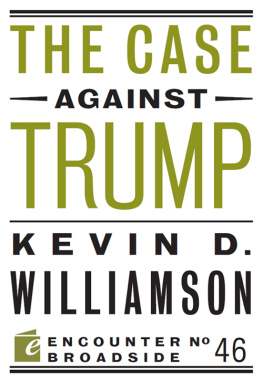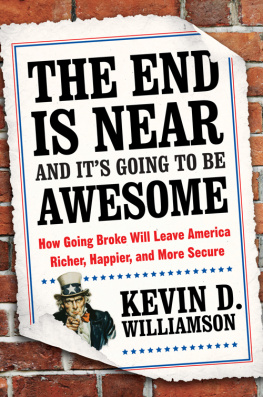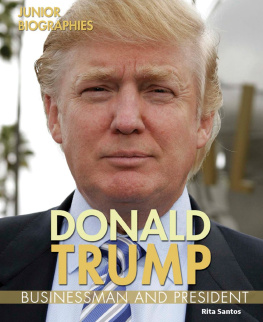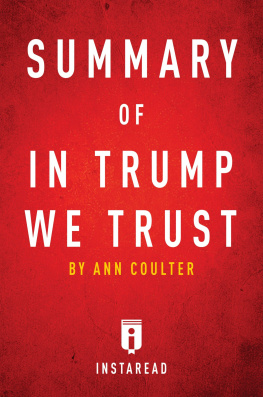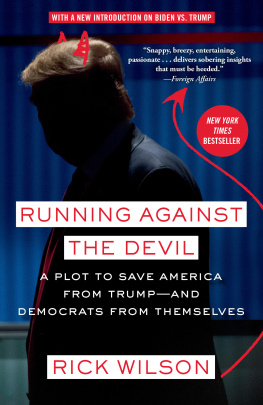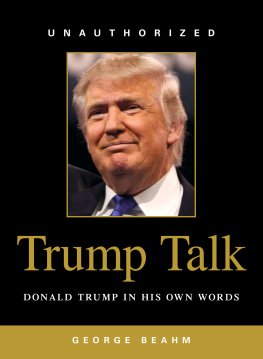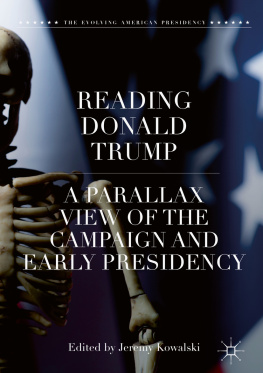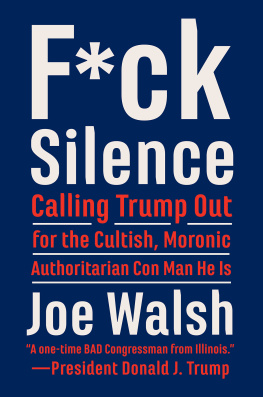
ENCOUNTER BROADSIDES Inaugurated in the fall of 2009, Encounter Broadsides are a series of timely pamphlets and e-books from Encounter Books. Uniting an 18th century sense of public urgency and rhetorical wit (think The Federalist Papers, Common Sense) with 21st century technology and channels of distribution, Encounter Broadsides offer indispensable ammunition for intelligent debate on the critical issues of our time. Written with passion by some of our most authoritative authors, Encounter Broadsides make the case for ordered liberty and the institutions of democratic capitalism at a time when they are under siege from the resurgence of collectivist sentiment. Read them in a sitting and come away knowing the best we can hope for and the worst we must fear.

G IVEN THE SLOP that passed for dinner in England in those dark centuries before the advent of Gordon Ramsay et al., it is difficult to credit but nonetheless true that one of the animating prejudices of British life was a bias against food imported from France, a country whose contribution to cooking is roughly equal to Greeces early work on political philosophy. That was the background of the debate over the Corn Laws, which tightly controlled trade in what Americans call wheat, barley, and rye. It was a red-letter episode in the development of free-market thinking, with Walter Bagehot and the Manchester liberals defeating on every substantive point the protectionists, who were dominated by landowning aristocrats unlike the tragedy of Richard III, here Richmond and Buckingham were on the same side cloaking their narrow, parochial self-interests with appeals to national security and patriotism. As often is the case in operational politics, winning the argument turned out to be worth precisely nothing: it took a famine to get Parliament to liberalize the Corn Laws. Those familiar with that debate surely shake their heads sadly at the spectacle of Senator Marco Rubio of Florida, a bright young conservative light and Republican presidential contender who nestles too comfortably in the pocket of the sugar barons, arguing that U.S. sugar subsidies are a matter of national security. Without protectionist subsidies, he says, other countries will capture the market share, our agricultural capacity will be developed into real estate and then we lose the capacity to produce our own food, at which point were at the mercy of a foreign country for food security. Richard Cobden and Lord Stanley weep.
Donald Trump smirks.
There is a profoundly illiberal tendency ascendant in American politics, and Donald Trump is its personification not only antitrade but venomously anti-immigrant, anticommerce, nativist, populist, crude, and driven by anxiety. Trump is all those things and more. Trump is not as far as the available evidence documents a racist, but the movement he leads is, heavy as it is with Confederate revanchists willing to overlook Trumps impeccably Yankee credentials and white nationalists who complain that the Republican Party and the American conservative movement have been willing parties to what they call race cuckoldry, a phrase with redolent sexual connotations that speak directly to the status anxiety at the heart of the Trump movement. Again, this is not to say that Trump is a racist there is little indication that he harbors the sort of views that made David Duke a power in the same atavistic circles or that all of his supporters, or even a majority of them, are racists. It is, however, impossible to separate the Trump movement from the racism and anti-Semitism that animate a nontrivial portion of its foot soldiers.

Donald Trump is poorly informed about immigration issues, and his policy proposals run from the ineffective to the fanciful.

The question is rendered more complicated by the fact that there is a legitimate concern at the heart of Trumps populist appeal and a legitimate foundation for the anxieties of his followers, including some of the detestable ones.
American institutions have failed, categorically, to address the problem of illegal immigration and in fact have gone so far as to studiously avoid even comprehending the question. The amnesty of 1986, agreed to by President Ronald Reagan, was sold as a prelude to the implementation of robust border-security measures, a classic case of politics on the Ill gladly pay you Tuesday for a hamburger today model. Millions more illegals crossed the border surreptitiously or entered legally and then overstayed the expiration of their visas. The official estimate is that there are some 11 million illegals residing in the United States, but the reality is slightly more complicated than that, given that their U.S.-born children are legal under the practice of birthright citizenship something Trump calls stupid and promises to end, though that is not actually within the scope of presidential power while many of the pre-1986 illegals never sought to have their situation normalized. The question of legal status is an important one, but it is more fruitful to approach this as a question of tribal conflict. The 11 million (or more) illegals are one constituent of a larger community of unassimilated Hispanic immigrants who form a tribe apart, whose identities are shaped more by Mexican and Central American sympathies than by mainstream American culture, and who are to a very large extent present in the United States for merely economic reasons.
The familiar litany of complaints is no less true for being dear to the hearts of bigots. Hispanics have significantly higher rates of welfare dependency than whites (Indicators of Welfare Dependence, U.S. Department of Health and Human Services), higher crime rates (Crime in the United States 2013, Federal Bureau of Investigation), and lower levels of educational attainment (U.S. Census). Studies do show that immigrants as a category raise real wages for the native-born population, but this is statistical sleight of hand: the study generally cited in service of this claim (by Patricia Cortes of the University of Chicago) is slightly misleading in that the claim of higher real wages excludes the 15 percent of the population who are immigrants (thus the native born qualifier). When the entire population is considered, the effects of immigration on domestic wages are slightly negative. And the positive effects on real wages for the native-born population come almost exclusively through putting downward pressure on prices (which sends real wages higher even when the number on the paycheck is the same, or lower) by lowering wages at the labor-intensive, low-skilled end of the market.
Discussing these issues forthrightly from a point of view of the American national interest is practically taboo.
The bipartisan consensus on the question of immigration is radically out of step with popular opinion (which typically runs about 70 or 80 percent in favor of stronger immigration controls) and reflects a nexus of political self-interest that is fundamentally corrupt. The Democrats believe, with good reason, that a growing Hispanic population means a growing Democratic base; Republicans, influenced partly by wishful thinking about their long-term prospects among Hispanic voters and partly by business interests that prefer a loosey-goosey immigration regime, have in their legislative efforts focused to a large extent on the less pressing question of normalizing the status of illegals currently residing in the United States and less on the much more pressing question of securing the border and getting control of visa enforcement.
Next page
